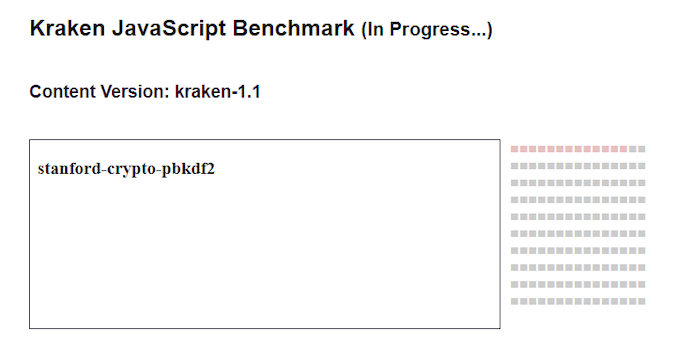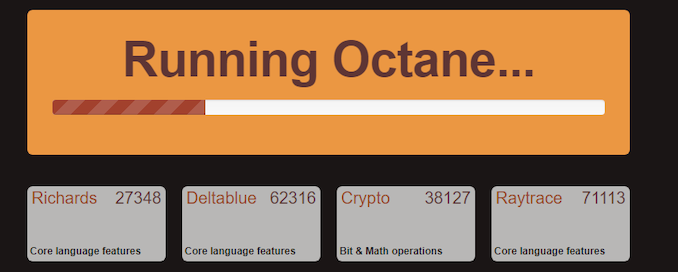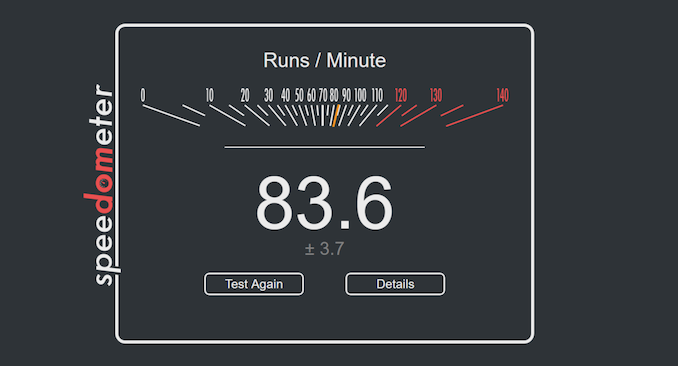Intel 11th Generation Core Tiger Lake-H Performance Review: Fast and Power Hungry
by Brett Howse & Andrei Frumusanu on May 17, 2021 9:00 AM EST- Posted in
- CPUs
- Intel
- 10nm
- Willow Cove
- SuperFin
- 11th Gen
- Tiger Lake-H
CPU Tests: Legacy and Web
In order to gather data to compare with older benchmarks, we are still keeping a number of tests under our ‘legacy’ section. This includes all the former major versions of CineBench (R15, R11.5, R10) as well as x264 HD 3.0 and the first very naïve version of 3DPM v2.1. We won’t be transferring the data over from the old testing into Bench, otherwise it would be populated with 200 CPUs with only one data point, so it will fill up as we test more CPUs like the others.
The other section here is our web tests.
Web Tests: Kraken, Octane, and Speedometer
Benchmarking using web tools is always a bit difficult. Browsers change almost daily, and the way the web is used changes even quicker. While there is some scope for advanced computational based benchmarks, most users care about responsiveness, which requires a strong back-end to work quickly to provide on the front-end. The benchmarks we chose for our web tests are essentially industry standards – at least once upon a time.
It should be noted that for each test, the browser is closed and re-opened a new with a fresh cache. We use a fixed Chromium version for our tests with the update capabilities removed to ensure consistency.
Mozilla Kraken 1.1
Kraken is a 2010 benchmark from Mozilla and does a series of JavaScript tests. These tests are a little more involved than previous tests, looking at artificial intelligence, audio manipulation, image manipulation, json parsing, and cryptographic functions. The benchmark starts with an initial download of data for the audio and imaging, and then runs through 10 times giving a timed result.
We loop through the 10-run test four times (so that’s a total of 40 runs), and average the four end-results. The result is given as time to complete the test, and we’re reaching a slow asymptotic limit with regards the highest IPC processors.

Google Octane 2.0
Our second test is also JavaScript based, but uses a lot more variation of newer JS techniques, such as object-oriented programming, kernel simulation, object creation/destruction, garbage collection, array manipulations, compiler latency and code execution.
Octane was developed after the discontinuation of other tests, with the goal of being more web-like than previous tests. It has been a popular benchmark, making it an obvious target for optimizations in the JavaScript engines. Ultimately it was retired in early 2017 due to this, although it is still widely used as a tool to determine general CPU performance in a number of web tasks.

Speedometer 2: JavaScript Frameworks
Our newest web test is Speedometer 2, which is a test over a series of JavaScript frameworks to do three simple things: built a list, enable each item in the list, and remove the list. All the frameworks implement the same visual cues, but obviously apply them from different coding angles.
Our test goes through the list of frameworks, and produces a final score indicative of ‘rpm’, one of the benchmarks internal metrics.
We repeat over the benchmark for a dozen loops, taking the average of the last five.

Legacy Tests

















229 Comments
View All Comments
mode_13h - Monday, May 17, 2021 - link
That's clearly not a M.2 drive and therefore not a laptop. Please reread my question.xpclient - Tuesday, May 18, 2021 - link
It is from an M.2 gen 4 drive in a gaming laptop - ASUS ROG Zephyrus S17 GX703 (GX703HS model – Core i9 11900H + RTX 3080 140W, 4K 120Hz screen) but I get your point - at the moment, not many will need such speeds. Gen 3 will serve them fine. Please do not question the benchmark itself. Personally I got an AMD Ryzen 7 5800H-based machine myself, without waiting for Tiger Lake H45.mode_13h - Tuesday, May 18, 2021 - link
xpclient> It is from an M.2 gen 4 drive in a gaming laptop - ASUS ROG Zephyrus S17 GX703xpclient> (GX703HS model – Core i9 11900H + RTX 3080 140W, 4K 120Hz screen)
BS. Look at the numbers: you cannot do 10.5 GB/s read or 9.8 GB/s write over PCIe 4.0 x4.
I don't know what it's from, but it's no mere x4 drive. Maybe a 4-drive RAID-0 or something like that.
Spunjji - Tuesday, May 18, 2021 - link
@mode_13 Those scores are from a laptop that comes with a 3-drive RAID-0 config, which is - quite frankly - an absurd setup to have by default for a gaming system.mode_13h - Tuesday, May 18, 2021 - link
spunji> Those scores are from a laptop that comes with a 3-drive RAID-0 configWow, so I was actually close!
> which is - quite frankly - an absurd setup to have by default for a gaming system.
Yeah, I'd say a 3-drive RAID-5 might make sense in a mobile workstation for editing digital cinema footage on-location.
xpclient - Wednesday, May 19, 2021 - link
@mode_13h and @Spunjji, my apologies. I didn't notice the 3 drive RAID config in that review article of an ASUS laptop and missed that completely. My bad.mode_13h - Thursday, May 20, 2021 - link
> my apologies.No problem. It did spark an interesting tangent about RAID in laptops.
Thanks for the follow-up. It's a good idea to sanity-check the numbers, since that's what first caught my attention.
Spunjji - Thursday, May 20, 2021 - link
@xpclient - no harm no foul!Bagheera - Tuesday, May 18, 2021 - link
let's not forget that Intel was 2 years late to PCIe4 on DESKTOP and Intel fans didn't seem to mind.mode_13h - Tuesday, May 18, 2021 - link
> let's not forget that Intel was 2 years late to PCIe4 on DESKTOPIt's there now. If you weren't in the market for a new PC in the past 2 years, what does it matter?
> and Intel fans didn't seem to mind.
Not even just Intel fans. AMD was early with their PCIe 4, on the desktop. That's why they caught Intel by surprise. Because, at the time, PCIe 3 was good enough. We're only just starting to see some minor advantages for PCIe 4, on the desktop. It's no game changer.
Honestly, of all the criticisms you could make of Intel, this is one of the weaker ones.